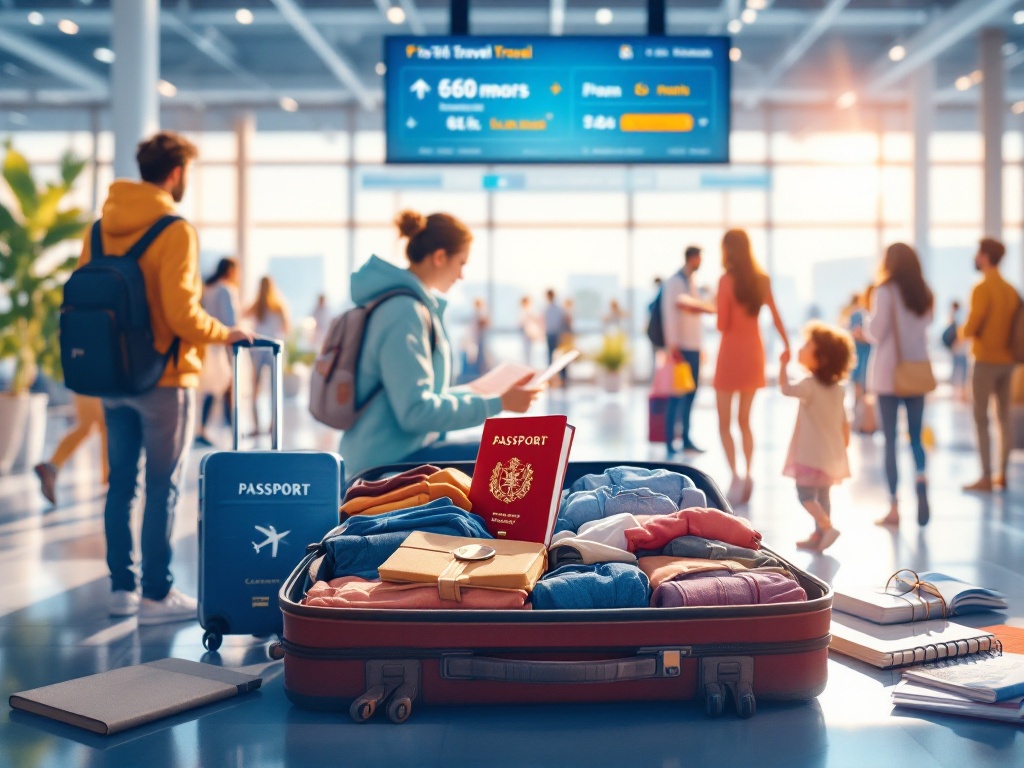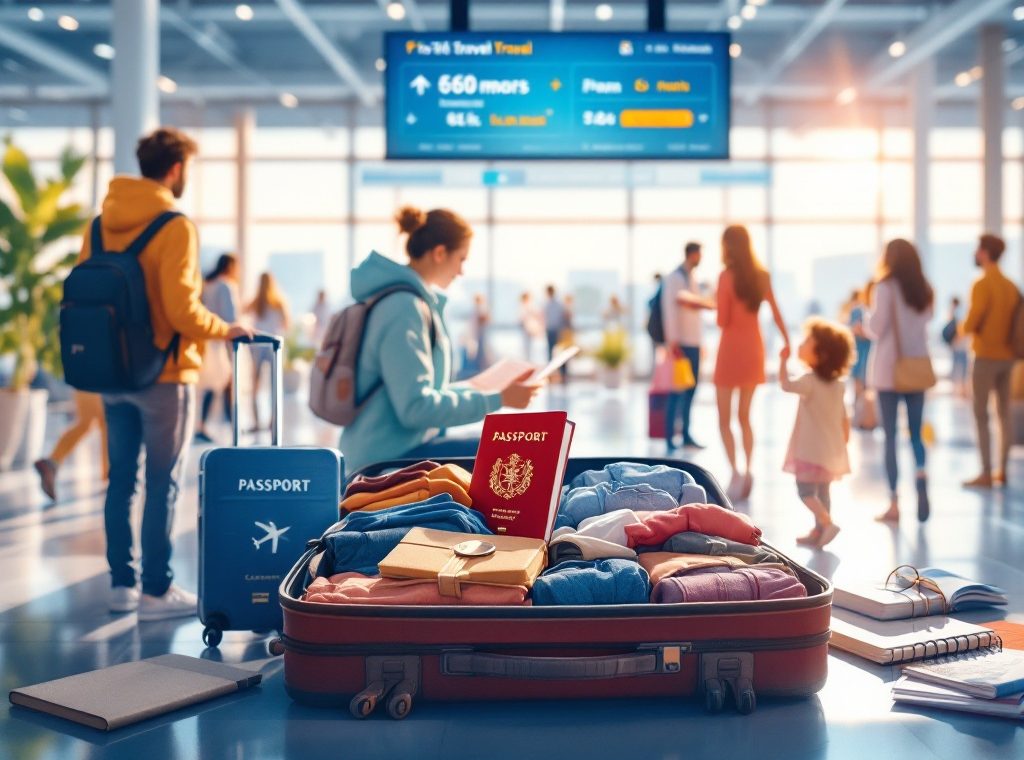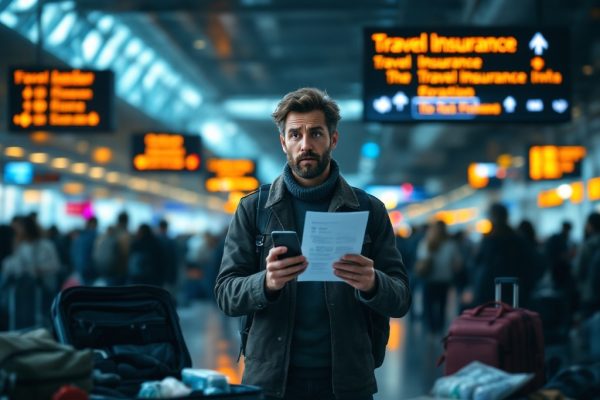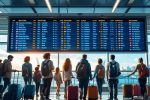International Flights: Crucial Information for Travelers
Planning an international trip? Ensure smooth travels by checking your passport’s six-month validity and researching visa requirements. Protect yourself with travel insurance and gather crucial documents. Learn about baggage restrictions and security procedures. Prepare for a comfortable flight and manage jet lag effectively. Discover tips for navigating customs, transportation, and cultural etiquette. Start planning your stress-free international adventure today!
Important information

- Passport and Visa: Ensure your passport is valid for at least six months beyond your return date. Check visa requirements for your destination and obtain one well in advance if needed.
- Travel Insurance: Purchase travel insurance to protect yourself against medical emergencies, cancellations, and other unforeseen travel issues.
- Health Preparations: Consult your doctor about recommended vaccinations and necessary boosters. Pack a first-aid kit with essential medications.
- Travel Documents: Make copies of important documents (passport, visa, itinerary, tickets) and store them separately from originals.
- Airport Procedures: Arrive at the airport early for international flights, especially with checked baggage. Utilize online check-in and be prepared for security screenings.
Planning Your International Flight
Planning international travel requires careful preparation. Follow these essential steps:
Check your passport’s validity. Ensure it’s valid for at least six months beyond your planned return date.
Research destination requirements. Before departure, thoroughly investigate your destination’s specific passport and visa requirements.
Consider travel insurance. Protect yourself against unforeseen issues by purchasing travel insurance.
Gather essential documents. Assemble all crucial documents, including your passport, visas (if necessary), and flight tickets.
Review travel restrictions. Carefully check travel restrictions for both your final destination and any transit countries before your trip.
Checking Passport Expiration and Validity
Your passport must be valid for at least six months beyond your return date for most international travel. However, requirements vary, so check your destination country’s specific rules. Depending on your nationality and destination, you may also need a visa. Research visa requirements well in advance of your trip.
Understanding Visa Requirements
A visa is an official travel document granting entry to a specific country. Visa requirements vary depending on your nationality and destination. For precise details, contact the embassy or consulate of the country you plan to visit. Some countries offer visa-free travel or visas upon arrival, depending on your citizenship. Remember, your passport usually needs at least six months’ validity beyond your intended stay, though some countries may require more. You might also need proof of onward travel, such as a return or connecting ticket.
Purchasing Travel Insurance
Travel insurance offers essential protection for your trips. A comprehensive policy safeguards you from various travel mishaps, including medical emergencies abroad, trip cancellations, and lost luggage. Secure your peace of mind and financial well-being before your journey for a worry-free travel experience.
Preparing Travel Documents
Planning an international trip requires careful preparation. A valid passport is essential, and it must meet your destination’s entry rules. Depending on your nationality and where you’re going, you might also need a visa. Make photocopies of your passport, visa, and other important documents like your itinerary and hotel confirmations. Keep these copies separate from the originals in case of loss or theft. Remember your travel insurance information and any required vaccination records. Finally, confirm your destination’s specific entry requirements before you leave, as these can change.
Check passport validity. Ensure your passport is valid for at least six months beyond your intended stay.
Visa requirements. Research visa requirements for your nationality and destination. Apply for a visa well in advance if needed.
Document copies. Photocopy your passport, visa, itinerary, and hotel confirmations. Store these copies separately from the originals.
Travel insurance and vaccinations. Carry your travel insurance information and any necessary vaccination records.
Double-check entry requirements. Confirm your destination’s specific entry requirements before departure, as they can change.
Checking Travel Restrictions and Regulations
Planning your next getaway? Before you pack your bags, take these essential steps to ensure a smooth and hassle-free journey:
Research destination regulations. Every country has its own unique entry and exit rules. Check for visa requirements, specific vaccination protocols, and any restrictions on bringing certain items into the country.
Understand item restrictions. Be aware of any limitations on bringing cash, food items, plants, animals, and souvenirs. Some countries have strict regulations regarding these items, so it’s crucial to be informed beforehand.
Review airline baggage policy. Familiarize yourself with your chosen airline’s baggage policy, including size and weight restrictions for both carry-on and checked luggage. Be mindful of potential baggage fees to avoid unexpected expenses at the airport.
Travel Preparations and Packing
Gather Essential Documents
Compile crucial documents like your passport, visa, tickets, and itinerary.
Pack Personal Items
Remember medications, toiletries, and clothing suitable for your destination’s climate.
Prepare Electronics
Don’t forget electronics, chargers, and necessary adapters.
Specialized Gear
Consider any specialized gear for planned activities, such as hiking boots or snorkeling equipment.
Health Preparations
- Research recommended vaccinations and consult your doctor about necessary vaccines or boosters.
- Prepare a well-stocked first-aid kit with essential medications and personal prescriptions.
- Consider travel insurance for unexpected medical expenses abroad.
Financial Planning
- Check the current exchange rate and exchange currency before departure or upon arrival.
- Notify your bank of your travel dates to avoid card blockage.
- Carry a mix of cash and credit/debit cards, and research local ATM fees and availability.
Efficient Packing Tips
- Adhere to airline baggage regulations.
- Keep essentials like medications, valuables, and important documents in your carry-on.
- Remember travel-sized containers for liquids and gels.
- Packing cubes can help organize clothing and maximize space.
- Clearly label both your carry-on and checked bags with your contact information.
Creating a Travel Checklist
Travel Documents
Start with essential travel documents: passport, visa (if required), boarding pass, driver’s license, and travel insurance details.
Clothing
Pack clothing suitable for the climate and your planned activities.
Electronics
Gather essential electronics like your phone, laptop, charger, and any necessary adapters.
Toiletries
Remember essentials such as your toothbrush, toothpaste, shampoo, and other personal care items.
Medications
Pack any required medications, ensuring you have necessary prescriptions.
Miscellaneous
Create a miscellaneous category for items like books, snacks, and a first-aid kit.
Health and Vaccination Considerations
Before your trip, take these important health precautions:
Check destination vaccination requirements. Some countries require proof of yellow fever, typhoid, or hepatitis A vaccination.
Ensure routine immunizations are up-to-date. Examples include measles and influenza vaccines.
Consult a healthcare professional. Discuss any health concerns before traveling.
Obtain travel insurance. This will protect you in case of emergencies abroad.
Pack a medical kit. Include necessary medications and prescriptions.
Currency Exchange and Financial Planning
Airport currency exchanges often offer poor exchange rates. Consider visiting banks or credit unions before your trip for better rates.
Prepaid travel cards are a great option, especially those with low or no foreign transaction fees. Debit cards with similar benefits can also be advantageous.
Budgeting is essential. Plan your expenses before your trip and track them while traveling to manage your money effectively.
Notify your bank of your travel dates to prevent any issues with using your card abroad and avoid unnecessary hassle.
Packing Carry-On and Checked Luggage
Pack essential items like travel documents, medications, and valuables in your carry-on bag. Check your airline’s size and weight restrictions for carry-on and checked luggage before your trip. Leave prohibited items at home for a hassle-free travel experience.
Airport Procedures and Security
Arrive early at the airport for international flights, especially if you have checked baggage.
Utilize online check-in to expedite the process. However, be aware that security procedures are still mandatory.
Be prepared for security screening, which includes metal detectors and X-ray scans for carry-on bags.
You may be required to remove shoes, belts, jackets, laptops, and liquids from your carry-on baggage. Ensure liquids comply with airline regulations.
Consider enrolling in programs like Global Entry, TSA PreCheck, or Mobile Passport Control for expedited screening and customs processing, if eligible.
Be prepared to present your passport to customs and immigration officials. They may also inspect your baggage.
Arriving Early and Online Check-in
Arrive at the airport three hours before your international flight. Online check-in is often beneficial, potentially securing better seats and expediting your airport experience.
Security Checks and Boarding Pass Requirements
Navigating the airport requires your boarding pass and ID. Security checkpoints utilize metal detectors and X-ray scanners to inspect baggage. Passengers typically remove shoes, belts, and jackets. Electronics and liquids must be placed in separate bins for screening. Remember, specific regulations vary by airport and country, with certain items potentially prohibited. Contact your airline or the airport directly for detailed information and procedural guidance.
Have your boarding pass and ID ready.
Be prepared to go through security checkpoints with metal detectors and X-ray scanners for baggage inspection.
Remove shoes, belts, and jackets.
Place electronics and liquids in separate bins for screening.
Check specific regulations for your airport and country, as certain items may be prohibited.
Global Entry, TSA PreCheck, and Mobile Passport Control
Global Entry expedites both security and customs for pre-approved, low-risk travelers entering the United States.
TSA PreCheck streamlines security screening at participating US airports, but it doesn’t cover customs.
Mobile Passport Control offers a way to speed up customs using a dedicated app for eligible travelers.
Customs and Immigration Procedures
Navigating customs and immigration requires presenting your passport and any necessary visas. You may also need a customs declaration form. Declare all items you’re bringing into the country honestly. Familiarize yourself with duty-free allowances. To ensure a smooth arrival, review the specific customs regulations for your destination, thus avoiding potential issues.
Present your passport and any required visas.
Complete a customs declaration form if necessary.
Honestly declare all items you are bringing into the country.
Understand the duty-free allowances.
Review the specific customs regulations for your destination to avoid potential issues.
Onboard Tips for Long Flights
Combat jet lag: Gradually shift your sleep schedule a few days before departure. During your flight, stay hydrated by drinking plenty of water and minimize caffeine and alcohol intake. Upon arrival, expose yourself to sunlight and engage in light exercise to help your body adapt to the new time zone.
Dress comfortably: Dress in comfortable layers to accommodate fluctuating cabin temperatures.
Prevent blood clots: On long flights, walk around the cabin every two to three hours to promote circulation. Simple in-seat stretches, such as ankle rotations and neck rolls, can also help.
Enjoy in-flight entertainment: Take advantage of the in-flight entertainment—movies, music, and TV shows are typically available. Utilize amenities like pillows, blankets, and eye masks for a more restful experience.
Plan your meals: Check meal options and dietary accommodations in advance. Consider bringing healthy snacks like nuts or dried fruit.
Arrival and Post-Flight Considerations
Getting around after your flight is easy, with plenty of transport choices like taxis, rideshares, and airport shuttles. Public transport is also a convenient option. Remember that local customs can be different, so researching etiquette beforehand is a good idea. Flight delays happen, but airlines usually offer support, and travel insurance can give you extra peace of mind.

















